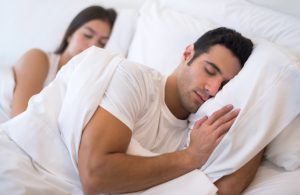
Treat your snoring with something more beneficial than earplugs. The SOMNODent family of oral appliances position the lower jaw of noisy sleepers in a more forward position, reducing or eliminating snoring and the adverse health effects associated with this sleep disorder. Dr. Donald M. Marks sees patients with snoring and sleep apnea in his State College office. He successfully treat many individuals for better rest and vibrant overall health.
Occasional Snoring or Something Worse?
Everyone snores from time to time. A stuffy nose from a cold or allergies, sleeping too long on one’s back–these cause some snoring that’s really nothing more than annoying. Some individuals, however, snore so persistently and loudly that whole households are disrupted. Beyond that, these individuals show signs and symptoms of something more troubling.
It’s called sleep apnea, and it’s an actual sleep disorder characterized by loud snoring and repeated episodes of startling awake gasping for breath. In fact, sufferers of sleep apnea awaken so many times during the night that they get very little rest and suffer from:
- Morning headaches
- Insomnia
- Drowsiness and fatigue
- Memory and concentration problems
- Depression and anxiety
- Irritability
- Loss of libido and sexual function
The underlying cause may be mechanical obstruction of the airway due to the relaxation of the soft tissues at the back of the throat. This is called OSA or Obstructive Sleep Apnea, and it’s the most common form of the sleep disorder.
Another kind is Central Sleep Apnea or CSA. In this case, the individual’s brain does not signal the respiratory system to breath continuously. Some people have a mixture of OSA and CSA.
Unfortunately, as this sleep apnea disorder in State College persists, the more systemic health effects occur. Sufferers have increased incidence of heart attack, hypertension, type-2 diabetes, obesity and other problems.
Who Gets Sleep Apnea?
Sleep apnea affects more than 18 million Americans, according to the National Sleep Foundation. Experts at the American Academy of Sleep Medicine stress the importance of controlling sleep apnea to avoid serious health conditions–both individually and as a nation.
Sleep apnea crosses line of age, gender and ethnicity, but more often seems to affect:
- Males over 40
- People with large necks
- Overweight individuals
- Those with narrow airways and nasal passages
- Those who smoke or abuse alcohol
- People with large tonsils
How It is Diagnosed
Sleep apnea is often diagnosed through a monitored sleep study at a physician’s office. This specially trained doctor can differentiate among normal snoring, CSA, OSA and mixed sleep apnea. He or she often prescribes CPAP therapy (Continuous Positive Airway Pressure), a machine which delivers oxygen via facial mask to force the airway open during periods of rest.
Many times, sleep physicians refer patients to Dr. Donald M. Marks at State College Dental Sleep Medicine for fabrication and placement of a custom snore guard. In general, this acrylic mouth guard gently repositions the lower jaw to a more forward position, opening the airway and preventing oxygen deprivation and the vibration we call snoring.
Dr. Marks presecribes several models of the SOMNODent oral appliance. Each are comfortable, adjustable and allow the wearer to speak and drink normally. Dr. Marks helps his patients decide which one is best for his or her particular situation.
Learn More
If your snoring is a big problem, it may be sleep apnea. Don’t ignore it. Contact Dr. Donald Marks for a consultation. He may refer you to a sleep physician for further evaluation to determine the right course of treatment.
